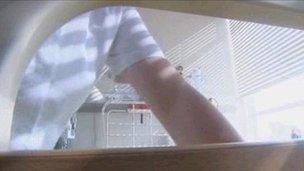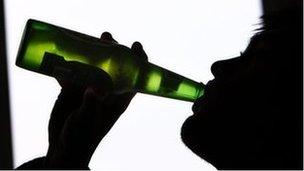Five things to look out for in 2013
- Published
The last year has seen a new health secretary appointed, the NHS reforms finally being pushed through parliament and a host of initiatives launched to encourage people to live healthier lifestyles.
The next 12 months promise to be just as eventful. But what are the key stories of 2013 likely to be in England?
A watershed moment before January is out?

Dr Foster looked at data from 145 hospital trusts in its review
Of all the scandals to have hit the NHS over the last few years, one stands out: the treatment of patients at Stafford Hospital.
From a variety of different sources, we know that more than 400 patients died "needlessly" because of poor care between 2005 and 2008.
Deficiencies were found at almost every level from the ward floor to the boardroom as financial targets took precedence over the quality of care.
It created a culture whereby thirsty patients had to resort to drinking from vases and receptionists were left to assess patients in A&E.
But the scandal goes much further than the mismanagement of one hospital.
Stafford was monitored by local and regional managers and a host of patient safety agencies and regulators. Doctors and nurses working there were part of professional bodies.
And yet it took Dr Foster, a private research company which analyses NHS data, to flag up the concerns that eventually lifted the lid on what had been happening.
All this and more has been looked at by a public inquiry, chaired by Robert Francis QC. His report is due to be published in the first few weeks of the year.
Will the government be bold with the old?
Report after report over the past 12 months has criticised the care provided to the elderly, prompting the new health secretary, Jeremy Hunt, to make it a priority when he took over the reins in September.
Of course, what happens in hospitals is key to this. But an often over-looked factor is the state of social care, which is essential in stopping the health and well-being of the elderly deteriorating.
The council-run system, which includes help in the home and care home places, is widely acknowledged to be on its knees.
For the past two years, ministers have been looking for a new way of funding the system.
One of the favoured proposals - put forward by the government-appointed Dilnot Commission - is the idea of capping the amount people have to pay towards their care.
But to the disappointment of campaigners ministers have been slow to make a decision.
When the social care white paper was published during the summer, there was no commitment on the cap and it appeared as if the issue had been punted into the long grass.
It is now understood that in recent weeks senior members of the government have begun discussing the merits of a cap again. It is certainly possible 2013 could see a major announcement in this area.
Getting tough on unhealthy habits

For a party which had spent much of its time in opposition criticising the "nanny state" tendency of the previous government, the Tories - albeit in a coalition - have proved surprisingly keen on trying to influence unhealthy habits.
This year has seen the government press ahead with two ground-breaking public health initiatives.
A consultation has been held over whether cigarettes should be sold in plain packets, paving the way for a decision in 2013. Only Australia - where a law came into force earlier this month - has taken such a radical step.
Plain packets are seen as an important measure in the battle to reduce smoking rates as they are effectively the last way in which the industry can promote their products.
Coupled to this, the government is in the middle of rolling out a ban on the display of tobacco products in shops.
But ministers have not stopped there. Despite initially being lukewarm to the idea of a minimum price for alcohol, in March the government proposed setting a unit price of 40p in March.
When the consultation then appeared in November, the figure had risen to 45p. Could it eventually go up to 50p as campaigners want and Scotland has already agreed to?
Money, money, money
The NHS is in the middle of its toughest ever savings drive. The budget is effectively frozen until 2015 and so to keep pace with the rising demands from factors such as the ageing population and obesity, the NHS has been asked to save up to £20bn - about 4% a year.
The government has claimed this can be achieved through efficiency savings and the frontline should not be harmed.
But many experts have doubts. A recent report by the National Audit Office warned there was some evidence trusts were beginning to ration care by putting tighter restrictions on operations such as cataract surgery.
It also predicted the efficiency drive was only going to get tougher as the easy savings - such as pay freezes - had been made first.
The NHS still has money up its sleeve - it made a £2bn surplus last year - but that masks the problems some individual trusts are having.
The numbers ending the year in debt doubled to more than 30.
One of the trusts with the most acute problems - South London Healthcare - was put into administration and is now likely to be broken up.
Other trusts will be looking on anxiously wondering if they will be following suit in 2013.
Get ready for the big bang

Will the NHS reforms kick in with a big bang? Probably not, but in time they could prove to be explosive
On 1 April perhaps the most radical change in the NHS since its creation will take place.
The NHS Commissioning Board will take over day-to-day running of the health service, while GP-led groups will gain control of much of the budget.
Of course, the new system has been operating in shadow form for some time, but next year will mark the moment when the new structures will be set free.
Of course, patients will not notice any difference at first. Hospitals and GP surgeries will all look the same.
But the "big bang" will undoubtedly be felt in the future.
As stated already, the NHS is facing a tough time financially.
Ministers hope the changes - described by NHS chief executive Sir David Nicholson as so big you can see them from space - will help the health service rise to the challenge.
If they don't succeed, expect fireworks both inside the NHS and in the Houses of Parliament.